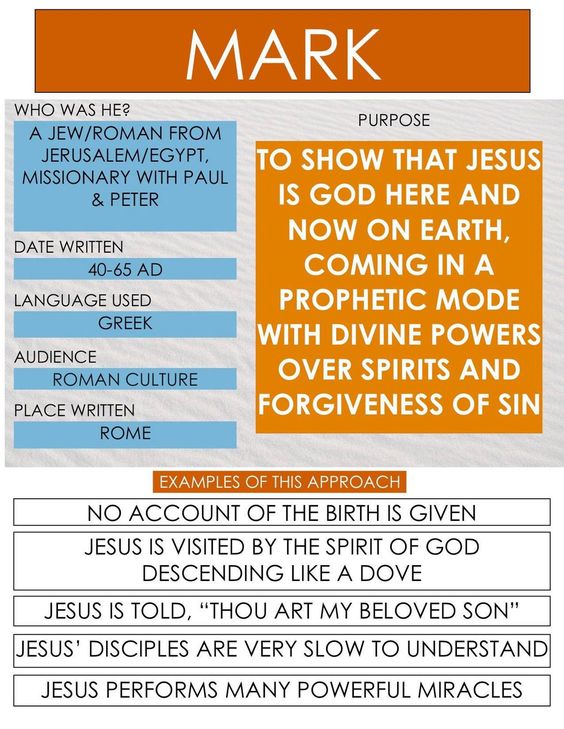One of the most popular Bible verses in the Gospel of Mark is Mark 12:30:
“And you shall love the Lord your God with all your heart and with all your soul and with all your mind and with all your strength.”
This verse is part of Jesus’ response to a scribe who asked him which commandment is the most important. It highlights the paramount importance of loving God with all aspects of one’s being, including heart, soul, mind, and strength.
The Book of Mark (PDF download)
An Overview
The Gospel of Mark, the second book of the New Testament, is a concise and dynamic account of the life, ministry, death, and resurrection of Jesus Christ. Written by John Mark, a companion of the apostle Peter, the Gospel of Mark is believed to have been composed around AD 60-70. Key Themes and Characteristics:
- Servanthood of Jesus: Mark presents Jesus as the Suffering Servant, emphasizing His humility, compassion, and willingness to serve others. The Gospel portrays Jesus as actively engaged in teaching, healing, and ministering to people from various backgrounds.
- Action-Oriented Narrative: Mark’s Gospel is known for its fast-paced and action-oriented narrative. It features numerous miracles, exorcisms, and encounters with individuals seeking healing and spiritual restoration.
- Emphasis on Jesus’ Authority: Throughout the Gospel, Mark emphasizes Jesus’ divine authority over nature, sickness, demons, and even death. Jesus’ authority is demonstrated through His teachings, miracles, and ultimate triumph over sin and death through His resurrection.
- The Messianic Secret: Mark includes instances where Jesus instructs His disciples and others not to reveal His identity as the Messiah (the “Messianic Secret”). This theme adds depth to the narrative and highlights Jesus’ divine timing and mission.
- The Way of the Cross: Mark devotes a significant portion of his Gospel to the events leading up to Jesus’ crucifixion, highlighting His suffering, rejection, and ultimate sacrifice for humanity’s redemption. The Gospel emphasizes the paradoxical nature of Jesus’ kingship and the necessity of His death and resurrection.
- Discipleship and Faith: Mark underscores the importance of discipleship and faith in following Jesus. The Gospel presents various responses to Jesus’ ministry, ranging from disbelief and opposition to genuine faith and discipleship.
Purpose and Significance
- Proclamation of the Good News: The primary purpose of the Gospel of Mark is to proclaim the good news of Jesus Christ as the Son of God and Savior of humanity. It presents Jesus’ life, teachings, death, and resurrection as central to God’s redemptive plan.
- Encouragement to Persecuted Believers: Mark’s Gospel was likely written during a period of persecution against Christians. The Gospel serves as an encouragement to believers facing adversity, reminding them of Jesus’ own suffering and victory over death.
- Instruction in Discipleship: Mark’s portrayal of discipleship challenges readers to follow Jesus wholeheartedly, embracing the call to self-denial, service, and commitment to the Kingdom of God.
- Theological Foundation: The Gospel of Mark contributes to the theological understanding of Jesus’ identity, mission, and significance within the broader narrative of salvation history. It affirms Jesus’ divinity, His fulfillment of Old Testament prophecies, and His role as the Messiah.
- Evangelistic Tool: Mark’s Gospel continues to serve as an evangelistic tool, inviting readers to encounter the person and work of Jesus Christ and respond in faith and discipleship.
In summary, the Gospel of Mark offers a compelling portrait of Jesus Christ as the Son of God and invites readers to respond to His message of salvation and discipleship. Its vivid narrative, theological depth, and practical insights continue to inspire and challenge believers today.

